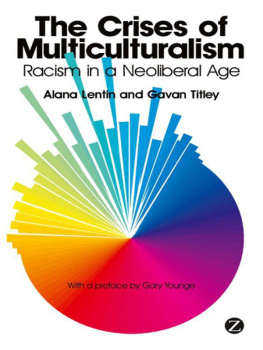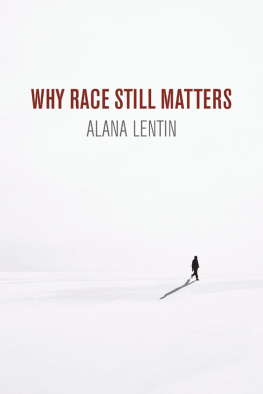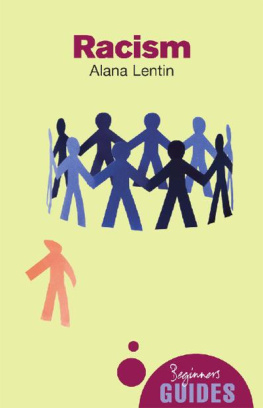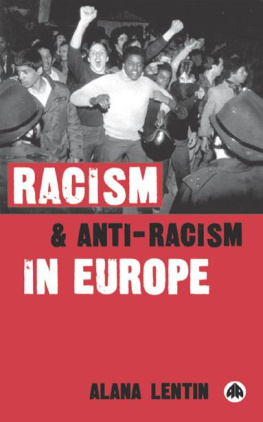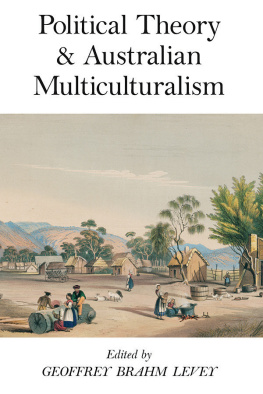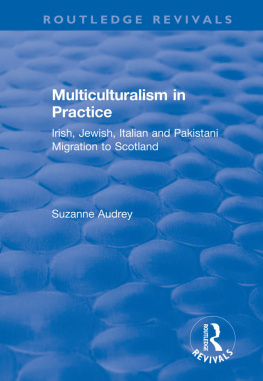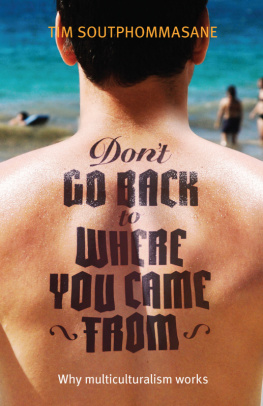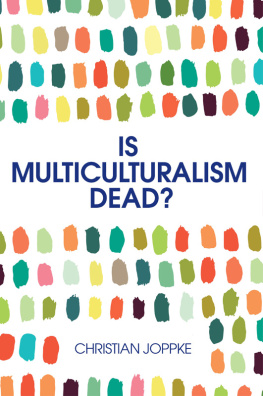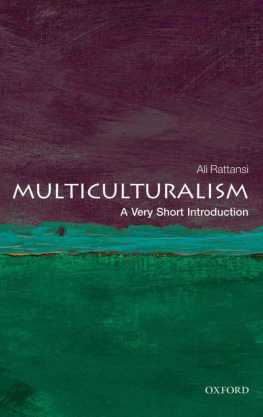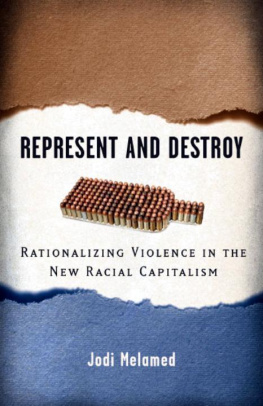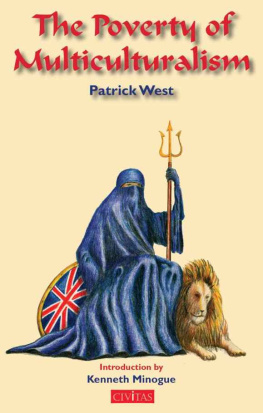About the authors
Alana Lentin is a senior lecturer in the Department of Sociology, University of Sussex, UK.
Gavan Titley is a lecturer in the School of English, Media and Theatre Studies, National University of Ireland, Maynooth, Ireland.

The Crises of Multiculturalism: Racism in a neoliberal age was first published in 2011 by Zed Books Ltd, 7 Cynthia Street, London N1 9JF, UK , and Room 400, 175 Fifth Avenue, New York, NY 10010, USA
www.zedbooks.co.uk
Copyright Alana Lentin and Gavan Titley 2011
The rights of Alana Lentin and Gavan Titley to be identified as the authors of this work have been asserted by them in accordance with the Copyright, Designs and Patents Act, 1988
Set in Monotype Sabon and Gill Sans Heavy by Ewan Smith, London
Index: ed.emery@thefreeuniversity.net
Cover designed by Stuart Tolley
Distributed in the USA exclusively by Palgrave Macmillan, a division of St Martins Press, LLC , 175 Fifth Avenue, New York, NY 10010, USA
All rights reserved. No part of this publication may be reproduced, stored in a retrieval system or transmitted in any form or by any means, electronic, mechanical, photocopying or otherwise, without the prior permission of Zed Books Ltd.
A catalogue record for this book is available from the British Library
Library of Congress Cataloging in Publication Data available
eISBN 9781780322360
Contents
Preface by Gary Younge
On 15 February 2006 in Strasbourg the head of the European Commission, Jos Manuel Barroso, delivered a stout defence of freedom of speech, democratic values and modernity on the continent. With the embers from heated exchanges over a Danish newspapers decision to publish cartoons of Muhammad still glowing, Barroso laid out the consequences of privileging sensitivity towards others over core values that define us. If Europe failed to defend its principles in the face of such an onslaught, he argued, we are accepting fear in our society [] I understand that offended many people in the Muslim world but is it better to have a system in which some excesses are allowed or to be in some countries where they dont even have the right to say this [] I defend the democratic system.
On the very same day in the House of Commons the British government employed fear of terrorism to limit existing freedoms, expanding state power to make glorification of terrorism a criminal offence. Laying out the consequences of privileging freedom over security, the then prime minister, Tony Blair, later explained that the law will allow us to deal with those people and say: Look, we have free speech in this country, but dont abuse it. For certain groups the price for belonging and conditions for banishment have shifted dramatically in Western nations, particularly but by no means exclusively in Europe, in recent years. Citizenship is no longer enough. The clothes you wear, the language you speak, the way you worship, have all become grounds for dismissal or inclusion. These terms are not only not applied equally to all, they are not even intended to be. In a series of edicts, popular, political and judicial, their intention is not to erase all differences but act as a filter for certain people who are considered dangerously different.
To achieve this certain groups and behaviours must first be pathologized so that they might then be more easily particularized. The pathologization has been made easier over the past decade by the escalation of terrorist acts or attempts in the USA and Europe in the name of radical Islam. Terror is first of all the terror of the next attack, explains Arjun Appadurai in Fear of Small Numbers . Terror [] opens the possibility that anyone may be a soldier in disguise, a sleeper among us, waiting to strike at the heart of our social slumber.
But in truth terrorism, and the wars and conflicts that exacerbate it, sharpened this trend and focused it on Muslims and Islam but did not create it. The notion that the presence of certain groups represents an existential threat to a mythological national cohesion was present in Enoch Powells infamous 1968 speech in which he prophesied violent consequences of non-white immigration in the UK: As I look ahead, I am filled with foreboding; like the Roman, I seem to see the River Tiber foaming with much blood. It was there in 1979 in Margaret Thatchers sympathy with Britons who feel they are being swamped by an alien tide. And it was front and centre in Jacques Chiracs 1991 Le bruit et lodeur speech. How do you want a French worker who works with his wife, who earn together about 15,000 francs and who sees next to his council house a piled-up family with a father, three or four spouses and twenty children earning 50,000 francs via benefits naturally without working [] If you add to that the noise and the smell, well, the French worker, he goes crazy.
For these threats to gain popular traction, however, these others have to be distinguished in the popular mind from other others. So when black people attack other black people it is no longer crime but black-on-black-crime; if a young Muslim woman is killed over a romantic relationship it is not a murder but an honour killing. In a country like England that has been embroiled in virtually continuous terrorist conflict for the last forty years in Northern Ireland, the notion that there are home-grown Muslim bombers is supposed to represent not just a new demographic taking up armed struggle but an entirely new phenomenon. Even as the Catholic Church is embroiled in a global crisis over child sexual abuse and the Church of England is splintered in a row over gay priests, Islam and Muslims face particularly vehement demands to denounce homophobia.
The combined effect of these flawed distinctions and sweeping demonization is to unleash a series of moral panics. In 2009 in Switzerland a national referendum bans the building of minarets in a country that has only four; in 2010 70 per cent of voters in the state of Oklahoma support the banning of sharia law even though Muslims comprise less than 0.1 per cent of the population; in the Netherlands parliament seriously considered banning the burka a garment believed to be worn by fewer than fifty women in the entire country. Disproportionate in scale and distorted in nature, these actions cannot be understood as a viable response to their named targets but rather as emblems of a broader, deeper disruption in national, racial and religious identities. At a time of diminishing national sovereignty, particularly in Europe, such campaigns help the national imagination cohere around a fixed identity even as the ability of the nation-state to actually govern itself wanes. It is a curious and paradoxical fact that as national boundaries in Europe have started to fade, the electoral appeal of nationalism has increased; fascism, and its fellow travellers, is once again a mainstream ideology in Europe, regularly polling between 5 and 15 per cent in most countries. Their success suggests that modernity, as it has been framed and presented, poses a challenge not only to Islam and that the demographic group finding it most difficult to integrate into modern society is a section of white society that feels abandoned and disoriented.
But such assaults are by no means the preserve of the far right. Many who consider themselves on the left have given liberal cover to these assaults on religious and racial minorities, ostensibly acting in defence of democracy, Enlightenment values and equal rights particularly relating to sexual orientation and gender. Their positioning rests on two major acts of sophistry. The first is an elision between Western values and liberal values that ignores the fact that liberal values are not fully entrenched in the West and that other regions of the world also have liberal traditions. Nowhere is this clearer than with gay rights, where whatever gains do exist are recent and highly contested. In the thirty-one American states where gay marriage has been put to a popular vote it has been defeated. The only places it is legal are where it has been ushered in through the courts. Not only is gay equality not a Western value, its not even a Californian value. The second is a desire to understand Western values in abstraction from Western practice. This surge in extolling Western virtues has coincided with an illegal war that has been underpinned by both authorized and unauthorized torture and a range of other atrocities and a spike in the electoral and political currency of racism and xenophobia.

